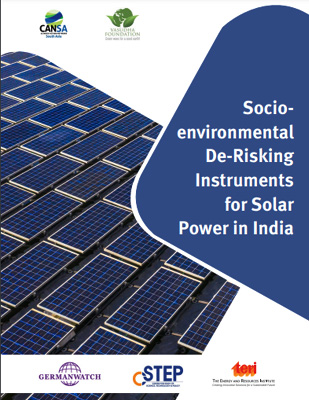
Publications
Socio Environmental De-Risking Instruments for Solar Power in India
Download Here
India has an ambitious target of achieving 100 GW of solar-based electricity generation capacity by 2022. However, technical, financial, and socio-environmental risks hinder large-scale investment in solar energy in India. In order to reduce or eliminate the actual risks and risk perception of investors, India needs investment de-risking of its solar energy sector. The current project ‘Multi-stakeholder Partnership on Derisking Investment in Solar Energy in India’ aspires to contribute in two ways—(i) studying and mapping potential risks of investments in solar energy in India and (ii) suggesting recommendations to strengthen de-risking instruments for (foreign) investment in India’s solar energy sector. This paper compiles findings from think tank analysis, publications, and common news stories, highlighting socio economic and environmental challenges of solar power (investment).
Solar energy has multifarious social, environmental, and economic benefits. The economic benefits include job creation and spin-off effect, which creates employment and revenues in other allied sectors. Despite having multiple positive effects, solar installations should be undertaken in a socially- and environmentally-viable manner. Large, centralized, and utility-scale installations of solar units should be taken up after analysing their potential complex impacts on the environment and social systems. A science-based assessment of social and ecological impacts of a solar project must be ensured considering proper opportunities for robust public involvement. It serves the sustainability of a solar project and hence, investment risks are reduced.




